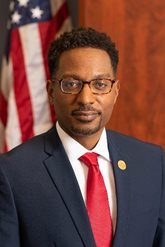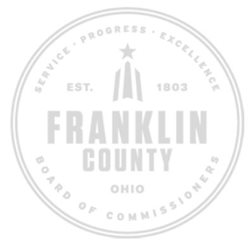WELCOME FROM COUNTY COMMISSIONER KEVIN BOYCE

Hello and welcome to the September edition of Commissioner Connection. I hope that you and your family are staying safe and healthy in these challenging times. Even if you are physically well, though, I understand that families in Franklin County are facing so many new challenges this summer.
On top of the virus, we are also faced with the challenge of working to shape the future of policing in our country as our area and so many others have seen significant civil unrest from residents demanding police reform. We now know that most schools in our region will be operating virtually to begin the fall, putting even greater stress on families that are already struggling to stay afloat. In addition, it’s also a presidential election year, with all of the emotion, outcry, and attention that comes from living in a swing state.
All of us are dealing with these challenges in some way or another, but we know that some families, some workers, some children, and some seniors are even more at-risk than others. And I want you to know that there is help available. The first article in the following newsletter is about all of the ways that your county commissioners are working to support the families and businesses in Central Ohio. We’ve already allocated more than $30 million to support struggling families and businesses, and my colleagues and I are committed to doing everything we can to ensure that our residents have what they need to get by and get ahead even in difficult times. There are so many types of assistance in the works.
In addition to working directly to support Franklin County residents, the Board of Commissioners has also been working directly with Franklin County Public Health to help share the most up-to-date information and protocols to help keep our community safe. Health Commissioner Mazzola has provided a guest column for our newsletter, which you can read below. We also have articles on CASA, or the Court Appointed Special Advocates for children that just became a part of the Franklin County Commissioners’ Office last month, the unusually high need for poll workers this fall during the presidential election, and a spotlight on one our superstar employees.
One last thing: if you haven’t taken the census yet, please go do it now. It’s vitally important to our community receiving the funding we need and the representation we deserve in Washington, and the deadline is fast approaching. You can take the census online at my2020census.gov, and learn all about it and why it’s so important at MakeFCCount.com.
Thank you for taking the time to learn about how your county government is working on your behalf even, and especially, in these difficult times. Please follow us on Twitter, Facebook, Next Door, and Instagram, and don’t hesitate to reach out to my office if we can ever be any help to you.

Commissioner Kevin L. Boyce
COMMISSIONERS’ SUPPORT HELPS KEEP FRANKLIN COUNTY BUSINESSES AND FAMILIES AFLOAT
 When the first case of COVID-19 was confirmed in Franklin County in early March, nobody had any idea of what form this new disease and our community’s response to it would take. Within days, schools were closed and businesses were shuttered state-wide. The county’s nearly 5,000 employees were mostly working from home all of the sudden, and tens of thousands of other workers throughout Franklin County found themselves furloughed, laid off, or in limbo.
When the first case of COVID-19 was confirmed in Franklin County in early March, nobody had any idea of what form this new disease and our community’s response to it would take. Within days, schools were closed and businesses were shuttered state-wide. The county’s nearly 5,000 employees were mostly working from home all of the sudden, and tens of thousands of other workers throughout Franklin County found themselves furloughed, laid off, or in limbo.
The commissioners jumped into action immediately, and have worked since the very earliest indications of the pandemic to help protect both the physical and economic safety of our community. They instituted daily phone calls with the leadership from every county agency and elected office, including updates from Franklin County Public Health. They worked with emergency management officials, the Central Ohio Trauma System, and the three largest hospital systems in our region to begin outfitting a 1,000-bed overflow surge hospital facility at the Greater Columbus Convention Center.
The commissioners also tasked their team with finding innovative ways to support the families and businesses that they knew were struggling across the region, and the team responded. To date, the commissioners have allocated more than $30 million to help families, businesses, employees, homeowners, renters, students, seniors, veterans, and the homeless weather this pandemic storm.
Within a month, the commissioners had passed 12 resolutions allocating almost $10 million, including support for small businesses with assistance from the Economic and Community Development Institute and the Columbus Urban League. They made grants to support individuals with the Workforce Development Board, the Ohio Hispanic Coalition, the Community Shelter Board, and the YMCA, as well as to LifeCare Alliance to provide free home-delivered meals to seniors so that they didn’t have to risk exposure by going to the store. The commissioners also allocated $1.5 million in direct assistance to families, and within another month, they had provided further support to pay for groceries for struggling veterans, more meals for seniors, rent assistance for those struggling without work, and more direct assistance to families.
Since then, the Board of Commissioners efforts have included more support for businesses, prescriptions for struggling seniors, the creation of a new equity alliance to support minority-owned businesses that have largely been left out of federal programs, and a new partnership to ensure that all Franklin County students are able to access the Internet as they learn from home this fall.
Nobody knows, of course, how long the pandemic may last or what new curveballs it may throw our way. The Franklin County Commissioners, however, will be ready to meet the challenge whatever it may look like, and to continue to support every resident every day as we all work through this unprecedented time together.
HISTORIC NUMBER OF NEW POLL WORKERS NEEDED FOR FALL ELECTION
 Every year, the Franklin County Board of Elections relies on the hard work of more than 5,000 poll workers at polling sites across the county to ensure the smooth operation of our elections. Due to the pandemic, however, several thousand of our neighbors who usually help in this way may not feel comfortable working the polls this fall.
Every year, the Franklin County Board of Elections relies on the hard work of more than 5,000 poll workers at polling sites across the county to ensure the smooth operation of our elections. Due to the pandemic, however, several thousand of our neighbors who usually help in this way may not feel comfortable working the polls this fall.
This year, the Board of Elections is leading a recruiting effort to encourage as many people as possible to sign up to work the polls. Anyone who is registered to vote in the county and has not been convicted of a felony is eligible to help, and can earn almost $200 for the day, depending on which role they fill at the polls. They need to be people persons, willing to attend a paid training session, have reliable transportation, and to be available to work all day on election day at one of the county’s polling places in schools, libraries, churches, and meeting halls across the community.
Members of some professions, such as attorneys and accountants, can even get continuing education credit for attending poll worker training, and many employers, including most county offices, even pay their employees their regular wage for the time they spend working the polls.
The dedicated and community-minded poll workers who help ensure free, fair, impartial, and smooth-running elections are a vital piece of our democracy. Without them, elections would not be possible, and our community would lose its voice.
If you’re interested in learning more about how you can help our community on election day, visit workelectionday.com today to learn more about how to become a poll worker.
CASA OF FRANKLIN COUNTY JOINS THE BOARD OF COMMISSIONERS
 Since 1991, a local nonprofit group called Court Appointed Special Advocates (CASA) has organized and trained volunteers to serve as advocates for vulnerable children caught up in the court system as the subjects of abuse and neglect cases.
Since 1991, a local nonprofit group called Court Appointed Special Advocates (CASA) has organized and trained volunteers to serve as advocates for vulnerable children caught up in the court system as the subjects of abuse and neglect cases.
The commissioners have supported CASA throughout its existence, but the yearly federal grants that the group relies on are shrinking. So, in July, the Board of Commissioners made CASA an official part of its Office of Justice Policy and Programs. The executive director of CASA is now an assistant director of OJPP, and the 11-member CASA team have become county employees. The office’s young clients shouldn’t notice any difference in the service they receive, but being part of county government should provide much more stability and predictable funding for CASA.
CASA volunteers spend time with and get to know the children they serve, which are typically victims of the most severe cases of abuse and neglect. In 2019, CASA of Franklin County served 882 children, assuring that each had an advocate and a voice in court.
SPOTLIGHT ON A COUNTY EMPLOYEE—Laura Repasky
 The Franklin County Department of Job and Family Services is responsible for basic financial, medical, and social services programing to ensure that nobody in our community is forced to go without essentials like food, clothing, shelter, and medical care, as well as workforce development and family support. The agency has almost 700 employees, and a nearly $100 million budget. About a quarter of all Franklin County residents are customers of one sort or another, and one of the people who helps keep the whole huge enterprise moving smoothly is Chief Operating Officer Laura Repasky.
The Franklin County Department of Job and Family Services is responsible for basic financial, medical, and social services programing to ensure that nobody in our community is forced to go without essentials like food, clothing, shelter, and medical care, as well as workforce development and family support. The agency has almost 700 employees, and a nearly $100 million budget. About a quarter of all Franklin County residents are customers of one sort or another, and one of the people who helps keep the whole huge enterprise moving smoothly is Chief Operating Officer Laura Repasky.
Thanks for taking the time to talk with us today about what you do for the county, Laura. Tell us a little about yourself, where you come from, and how you came to be in the position you’re in now.
Well, I grew up near Tiffin, Ohio, went to Capital University, and then to Ohio State for Law School. I always wanted to work in public service, and even though I didn’t expect to start that right out of school, I went to work as a staff attorney for one of the courts in my first job as a lawyer. After a few years with the courts, I took a staff attorney job at JFS in 2011, and I’ve been there ever since.
Tell us a little about what all Job and Family Services does, and how it relates to the state department with the same name.
County JFS provides a whole host of supports for families and individuals, from job assistance, SNAP (which is the Supplemental Nutrition Assistance Program, or food stamps), Medicaid, the Ohio cash assistance program, and other emergency support for families. In addition to that, JFS also contracts with human services partners for a further $30 million in support for our residents. The state Job and Family Services department, on the other hand, oversees a lot of what the counties do, and they provide Unemployment Insurance. In most counties, they also provide Child Support enforcement and Children Services, but in Franklin County we have separate departments for that.
And what’s your roll in all that?
As Chief Operating Officer, I work under our agency director to manage the day-to-day operations of our office, and to provide the best service we can for our customers while also complying with all the state and federal laws that govern what we do.
How has the pandemic affected your customers?
Of course the stay-at-home orders meant that a whole lot of folks were suddenly missing income because of furloughs and layoffs. That meant we saw a big increase in applications for benefits all at once, and at a time when our own office was also trying to navigate how we should operate in the pandemic.
And how has it affected your team?
We immediately scaled back in-person service options to help stem the transmission of COVID, and shifted resources to improve our ability to serve people online and over the phone. In some ways that’s been really helpful to our customers because they can reach us 24/7 online instead of having to come to our lobbies during certain hours (and I don’t think most of them want to be sitting in a crowded place right now either). We do still have drop boxes at our buildings, though, for people who feel more comfortable dropping materials off in person.
What’s a typical day like for you?
No such thing, and that’s part of what I love about it. Sometimes I’m dealing with some internal issue, having meetings with some of our community service partners about how what they do overlaps with what we do, and sometimes I’m working to resolve an issue that one of our customers is having.
What do you like best about your job?
I do like that it’s unpredictable and that no two days are alike. I’m also really fortunate to get to work with a great team here at JFS, and what we do is really important and fulfilling.
What’s the hardest part of your job?
Sometimes it’s that same unpredictability. It’s tough to plan your day one way and then have to spend a lot of it working on something completely unexpected.
What do you wish more people knew about JFS?
Just the whole breadth of what we do. Most folks only think of the one way that they interact with our office, but we really do so much. I also wish people realized how expert our staff are in their roles. The rules, laws, and regulations that govern a lot of the programs we administer are very, very complex, and our team has to be familiar with those, all while juggling multiple computer systems and providing excellent customer service.
I understand that you also work the polls on election day, and have been doing that even longer than you’ve been at JFS. How did you get into that and what’s it like?
Yeah. I’ve been doing that for about 15 years, and I really like it. I’m committed to public service, so even though it’s a long day-- sometimes sixteen hours-- it is also very fulfilling. I like getting to interact with all my neighbors on election day, and seeing the same ones year after year, even watching their kids grow up over the years. The Board of Elections pays poll workers, of course, and the county also encourages its employees to help out in this way by paying them for the day off if they sign up to work the polls.
The Board of Elections is really working hard to recruit poll workers this year. I hope there will be enough.
I think the pandemic is going to mean that we need a lot of new poll workers this year, so I’ve been recruiting friends and neighbors, and I hope lots of new folks will sign up.
Anything fun your coworkers don’t know about you yet?
Not too many of my coworkers know I do ceramics. I make decorative items, wall hangings, pots and vases, and more. I occasionally sell a few, but more often gift them to friends and family. It’s amazing to start with a lump of clay and end up with something beautiful, and pounding clay is also a pretty good stress reliever, so that’s a big benefit too.
A Guest Column From Franklin County Public Health Commissioner Joe Mazzola
 As we continue to navigate through the COVID-19 pandemic, we find ourselves working, parenting, educating, eating, shopping, exercising and socializing in a completely different way, but we must stay the course. Franklin County has lost more than 550 of our friends, relatives, and neighbors to this disease. The use of face coverings, along with proper hand washing and social distancing, is the best way to keep everyone safe, get our kids back in class, and our businesses open again.
As we continue to navigate through the COVID-19 pandemic, we find ourselves working, parenting, educating, eating, shopping, exercising and socializing in a completely different way, but we must stay the course. Franklin County has lost more than 550 of our friends, relatives, and neighbors to this disease. The use of face coverings, along with proper hand washing and social distancing, is the best way to keep everyone safe, get our kids back in class, and our businesses open again.
In our community, we continue to see the highest number of cases in those between the ages of 20 and 39 years old. Many young adults, who contract the virus, may develop very mild symptoms or may be asymptomatic, creating a risk to everyone they encounter because the disease spreads so easily. An infected person can infect two others and those two can infect two others and it goes on and on. It is essential that young people adhere to the six-foot social distancing guidelines by avoiding large crowds, huddling in groups, and sharing hugs or drinks.
All of us need to continue to do our part in order to help stop the spread of COVID-19. Please stay home if you are sick. Get tested if you have symptoms, and then remain at home until you get your test results. If you test positive for COVID-19 or have been identified as a close contact of a confirmed case, cooperate with the contact tracer who calls you, and follow their instructions. The information you provide is another significant step to stop the chain of transmission in our community.
What else can you do? Stay informed. Visit our website at covid-19.myfcph.org for up-to-date information on the number of cases in Franklin County and how our numbers are trending. You can also find testing locations, tips on protecting yourselves and others and a significant number of resources for families, business and the community. Follow us on all social media outlets, too.
We thank the community for its continued efforts to minimize the impact this pandemic is having on our county, and we recognize that it is hard and frustrating at times. We must remain vigilant and take every precaution to protect ourselves including staying home when possible, frequent handwashing, wearing masks and social distancing. Together we will get through this and come out stronger on the other side.